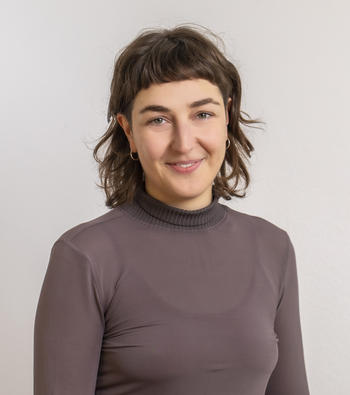Janette Helm

Doctoral Researcher Reflection
Pronouns: she/her
Since 02/2024 Universität Zürich, PhD in Empirical Cultural Studies, Project for dissertation: Interventionskonflikte: Aushandlungsprozesse zwischen Wissenschaften, Künsten und Öffentlichkeiten (working title)
10/2015 – 09/2018 Goethe-Universität/Städelschule, Frankfurt am Main Curatorial Studies – Theory-History-Criticism, M. A., Thesis: New Museology und „Source Communities“. Diskurse von Chancen und Herausforderungen bei kollaborativen Museumsprojekten
08/2014 – 01/2015 Universität Stockholm, Schweden Social Anthropology
10/2012 – 09/2015 Eberhard Karls Universität, Tübingen Empirical Cultural Studies, English and American Studies, B. A., Thesis: The Museum Selfie as the Emergence of a Cultural Practice – Opportunity or Threat?
Professional ExperienceSince 01/2023 Humboldt-Universität zu Berlin Doctoral Researcher at Collaborative Research Centre 1512 “Intervening Arts”
11/2020 – 12/2022 Linden-Museum Stuttgart Research Assistant and Project Manager „LindenLAB“
11/2018 – 11/2020 Landesmuseum Württemberg/Museum der Alltagskultur, Stuttgart Position as a Research Trainee
09/2016 – 05/2017 Frobenius-Institut, Frankfurt am Main Freelance Work in Ethnographic Collection
11/2015 – 11/2016 Städel Museum, Frankfurt am Main Student Assistant
02/2015 – 07/2015 Stadtmuseum, Stuttgart Freelance Work in Cultural Mediation („Stadtlabor“)
Scholarships / Social Commitment2021 Founder of „Museums For Future Germany“
2019 – 2020 Spokesperson for the Research Trainees at Museumsverband Baden-Württemberg e.V.
2019 Scholarship holder of Henry Arnhold Dresden Summer School, Topic: „Kulturinstitutionen im Fokus gesellschaftlicher Polarisierungen“
Winter Semester 2023/2024 Radical Futures? Museums, collectives and public(s) as places of intervention, together with Hana Ćurak and Sarah Etz
Project for dissertation "Conflicts of Intervention: Negotiation Processes between Academia, Arts and Public Spheres"
The Collaborative Research Centre 1512 "Intervening Arts" is characterized by an (inter-) disciplinary and material-rich examination of intervening art practices and art forms. In the individual projects, the researchers work together with artists and cultural institutions or try out aesthetic-experimental formats themselves as part of their research.
In my dissertation, I analyze the connections between academia, arts and public spheres as a multi-layered network of relationships that is constituted by the Collaborative Research Centre and its research partners. This network of relationships is characterized by various conditions, such as inter- or trans-institutional cooperations with partners, (state) funding opportunities for artistic projects, but also by the growing imperative of effect of the sciences in public areas.
I examine the collaborative formats and research of the Collaborative Research Centre, which unfold in sensory and media practices with their meaning in relational material-symbolic arrangements and economies. In this context, various artistic and research practices of the Collaborative Research Centre and the associated networks of relationships interact multidirectionally. They are part of larger socio-political contexts that are power-laden and asymmetrical. For example, the economic conditions and institutional requirements of artistic and academic work are conflictual. The resulting tensions between academia, arts and the public sphere are evident in various places and are also reflected in the laboratory formats and collaborations of the research network itself.
At the same time, artistic and research practices are to be understood as part of an aesthetic practice in which actors can create differences, affiliations and meanings, but also undermine them. By intervening in social contexts within the Collaborative Research Centre, the arts and artistic methods themselves (inter)act in social, political and cultural public spheres or create them. In my dissertation, I examine the resulting relationships between academia, arts and public spheres and their effects as specific logics of intervention. I understand them as practices of making oneself understood between different actors, which are sometimes influenced by certain policies.
2024 Review: Büchel, Julia: „Repräsentation – Partizipation – Zugänglichkeit. Theorie und Praxis gesellschaftlicher Einbindung in Museen und Ausstellungen.“ in: Zeitschrift für Empirische Kulturwissenschaft (1/24).
2023 „Das Linden-Museum befragt die Stuttgarter Stadtgesellschaft. Vorstellungen und Zukunftsperspektiven für ein ethnologisches Museum.“, in: Standbein Spielbein – Vom kritischen Vermitteln und Verlernen im Museum (1/23), pp. 93-101.
„LindenLAB 8 − Was bleibt?! Erkenntnisse für die Zukunft des Linden-Museums.“, in: LindenLAB. Partizipation, Provenienz, Präsentation. Projektdokumentation 2019-2023, pp. 154-159.
„Was bleibt. Eine Auswahl an Ergebnissen aus unserer Befragung zum Linden-Museum 2021.“ URL: https://www.lindenmuseum-befragung2021.de/ (last access on 28/02/2024).
2022 „Kennen Sie das Linden-Museum?“, in: neues museum. Die österreichische Museumszeitschrift 1(22), pp. 20-25.
2021 Review: Sarr, Felwine und Bénédicte Savoy: „Zurückgeben. Über die Restitution afrikanischer Kulturgüter,“ in: Zeitschrift für Volkskunde (1/21), pp. 123-125.
2020 „Mülltrennung ist Einstellungssache. Müllwerker*innen als Akteur*innen im Klimawandel“, in: Kuckuck. Notizen zur Alltagskultur (2/20),pp. 44-47.
2019 „Q wie Qualität und Quantität“, in: Jubiläumspublikation Das Museum der Alltagskultur von A bis Z.
2017 „Chocolate and a Fake Cherry Tree“, in: Jubiläumspublikation 200 Jahre Städelschule, pp. 55-132.
Talks08/10/2020 Lecture at the conference An ethnology lab on the workings of Covid-19 on museums by the SIEF working group Museums & Material Culture, by COMCOL and the Reinwardt Academy, titel: „Back to normality? Everyday life defies Corona”